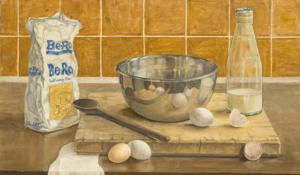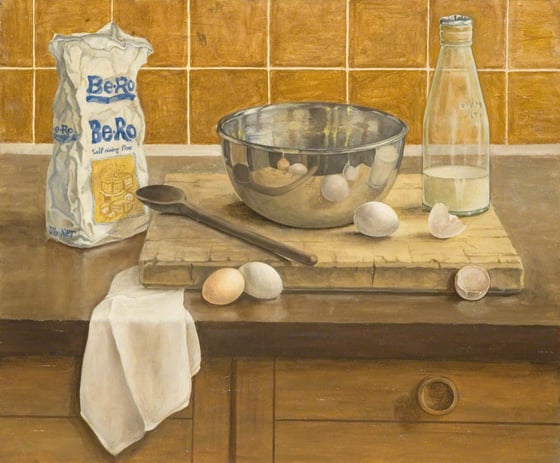VM5: Making Meringues

The Week Ahead
Do you remember the first time you stayed up all night? Maybe it was at a sleepover party, or on a long, long drive when you couldn't take your eyes off the stars floating above. Or maybe you couldn't turn off your brain, no matter how hard you tried. This week will be a great time to embrace taking the slow road and enjoying the ride. Just remember the rules of the road: Bring a friend. Carry snacks. Sing like a fool at the top of your lungs.

I realized I was a night owl when I was 14 years old. It only took about three consecutive weeks of lying in bed, staring at the twining vines on my bedroom wallpaper to decide that what I was feeling wasn't hormones (except it was) or existential angst (that too), it was alertness.
I was just... awake. And ready to do something.
That's when I started baking at night.
It seemed like the ideal solution. Baking was quiet — I wouldn't wake up my mother or brothers or one of our (several) Newfoundland dogs. It was challenging — I didn't have much experience with cooking, and practically no exposure to the mysteries of baking, so it appealed to my need to excel at hard things.
Most of all, it gave me a place to expend my teeming reserves of teenage energy, and didn't involve roaming the deserted, dark streets of Olde Cape Cod. Which was what my brain was telling me I really wanted to do.
The only hitch was, we didn't have much in the way of modern cooking devices. We’d inherited our house from my elderly great aunt, along with all her possessions. Most of her possessions seemed to have been acquired between about 1890 to 1930.
This one fact explains a great deal about me.
So while we didn’t have a dishwasher, blender, or food processor, we did have a killer collection of old cookbooks. War ration cookbooks, pre-war cookbooks, even a few late Victorian cookbooks. The kind that start off by telling you how many logs to put on the fire.
So things like meringues (which I loved) involved whisking egg whites by hand for about 45 minutes (because we didn't own a blender). "Until stiff peaks form," as the recipe says. And friends, that takes a long time when you are whisking by hand.
Then you put them in the oven (a "slow" oven, which took me a while to sort out meant "not very hot") for a whole hour. During which time you should turn your music way up (headphones are suggested for this part of the plan) and dance around like a fool for as long as you can.
Later, I learned to delay any creative work until the middle of the night. Writing, compiling notes for research papers, math homework, memorizing lines. These were the things I discovered went much better if I did when my mind was at its most sharp.
I think about meringues sometimes when I'm designing content for software. Is that weird?
Night time is the right time (for me)
I try not to assume everyone likes to do the same thing at the same time of day. So it makes sense to give people the option to schedule check-ins, updates, emails, and so on, for a time that works best for their brain as well. This isn’t just about letting people adjust to their time zone. It’s about inviting users to adapt to their own circadian rhythms, too.
Let me put off doing hard things
Let folks do thinky bits later, if they so choose. I’ve almost signed up for about three things in the last week alone, but got stuck when they asked me to write a paragraph about myself. There was no way to skip this step; I had to do it then. So I bailed. Give people a chance to do higher cognitive-load tasks when they want to, not when your growth model says it’s “best” that they do.
Let me go my own way
I like to tell folks what they can do, not what they can’t. If I really need certain things to happen in a certain order or by a certain time, I'll give them choices and options as to how they can proceed. They might not be up for writing a bio at the moment, but would be happy to upload a profile picture. You might not have time to watch a 3-minute video now, but you could maybe read a quick doc. I'll try to give you options so you can do what your brain, preferences, and circumstances allow.
Meringues have implications for the creative process, too. Oh, come on. You knew they would.
They remind me to:
Make time for unscheduled time
Making meringues reminds me there’s no shortcut to creativity. Just like you can't microwave a meringue, you can’t fast forward through to what a good hour of daydreaming, brainstorming, and rough drafting will yield.
Go low tech and boring
“Making meringues” is still my internal shorthand for doing something by hand, even when there are super useful, labor-saving devices that could speed it up. While I love tech (a lot) and speed (even more), there’s something magical about giving yourself permission to space out and see what comes out of your hot oveny mind.
Give your body something interesting to do
One of my favorite writing tricks is to write a terrible first draft and then go for a run. I always log my best times on those runs, as I generally realize what I should have written when I'm a few miles out, then turn around and race home to write it all down.
When do you do your best work? How — and when — do you make your meringues?

Eat Me
The meringue recipe I used was from the 1964 Joy of Cooking cookbook. This recipe is the closest I could find to the recipe I remember making by hand. The cookbook I read the most for fun was the Fannie Farmer Boston Cooking School Cook Book, 1918. I still cherish the tips in the chapter called Helpful Hints for the Young Housekeeper.
Take Me Out
One of the greatest pleasures of cooking alone in the small hours of the night is dancing around in the kitchen like a fool to songs you will know by heart until your last dying day. If you ever have the misfortune of joining me for a night of karaoke, you will undoubtedly be treated to this little gem. I will insist that we do it as a duet.
.png?width=100&height=100&name=bd%20(2).png)

